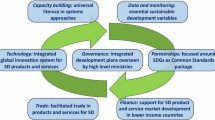
Overview
- This book is open access, which means that you have free and unlimited access
- Presents novel methodologies for assessing EU operational programmes
- Includes a tutorial of a web application to support the use of value-based data envelopment analysis
Part of the book series: Springer Proceedings in Political Science and International Relations (SPPSIR)
Included in the following conference series:
Conference proceedings info: EvEUCoP 2022.
Buy print copy
Tax calculation will be finalised at checkout
About this book
• Research, technological development, and innovation;
• Information and communication technologies;
• Shift toward alow-carbon economy.
During the 2014-2020 programmatic period, member states were required to undertake assessments to evaluate the efficacy, efficiency, and impact of each operational program. Such evaluations are generally concerned with the compliance of projects and activities with programmatic priorities, as well as with funds' absorption capacity and refer to ex-ante and ex-post assessments. Hence, this book proposes the use of novel methodologies addressing the mid-term and terminal assessments that enable performing the efficiency appraisal of the operational programs and that can support decision-makers in the selection of projects that should be awarded for funding.
Similar content being viewed by others
Keywords
- Open Access
- European Union policy
- European regional development funds
- Small and mid-sized enterprises
- Low-carbon economy
- Information and communication technologies
- Smart specialization
- Research and Innovation
- Energy efficiency
- Data envelopment analysis
- Meta-analysis
- Implementation of EU funds
- Youth
- Eastern Europe
- European structural and investment funds
- Machine learning models
- ERDF
- DEA models
Table of contents (12 papers)
-
Front Matter
-
Mid-term/terminal Assessment: Data Envelopment Analysis Approaches
-
Front Matter
-
-
Ex-post Assessment: Meta-analysis
-
Front Matter
-
-
Methodologies for Supporting the Selection of Projects
-
Front Matter
-
Other volumes
-
EU Cohesion Policy Implementation - Evaluation Challenges and Opportunities
Editors and Affiliations
About the editors
Clara Viseu is an assistant professor at the Polytechnic Institute of Coimbra, Coimbra Business School (Portugal), and a collaborator researcher at the CMA-UBI, as well as an associate member at the CICF-IPCA. She holds a Ph.D. in Mathematics from the University of BeiraInterior (Portugal) and a Master’s degree in Probability and Statistics from the University of Lisboa (Portugal).
Bibliographic Information
Book Title: EU Cohesion Policy Implementation - Evaluation Challenges and Opportunities
Book Subtitle: The 1st International Conference on Evaluating Challenges in the Implementation of EU Cohesion Policy (EvEUCoP 2022), Coimbra, 2022
Editors: Carla Henriques, Clara Viseu
Series Title: Springer Proceedings in Political Science and International Relations
DOI: https://doi.org/10.1007/978-3-031-18161-0
Publisher: Springer Cham
eBook Packages: Political Science and International Studies, Political Science and International Studies (R0)
Copyright Information: The Editor(s) (if applicable) and The Author(s) 2023
Hardcover ISBN: 978-3-031-18160-3Published: 30 November 2022
Softcover ISBN: 978-3-031-18163-4Published: 30 November 2022
eBook ISBN: 978-3-031-18161-0Published: 29 November 2022
Series ISSN: 2731-6890
Series E-ISSN: 2731-6904
Edition Number: 1
Number of Pages: XII, 193
Number of Illustrations: 6 b/w illustrations, 46 illustrations in colour
Topics: Public Policy, European Politics, Economic Growth, Business and Management, general, Economic Policy, Environmental Policy



